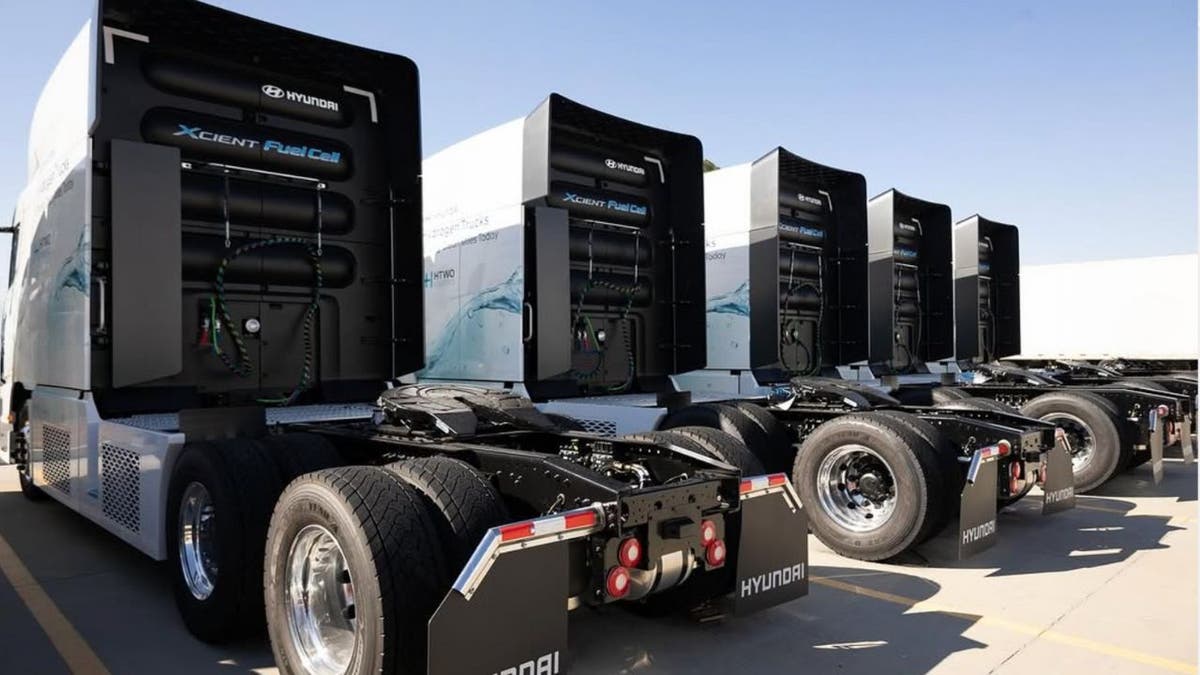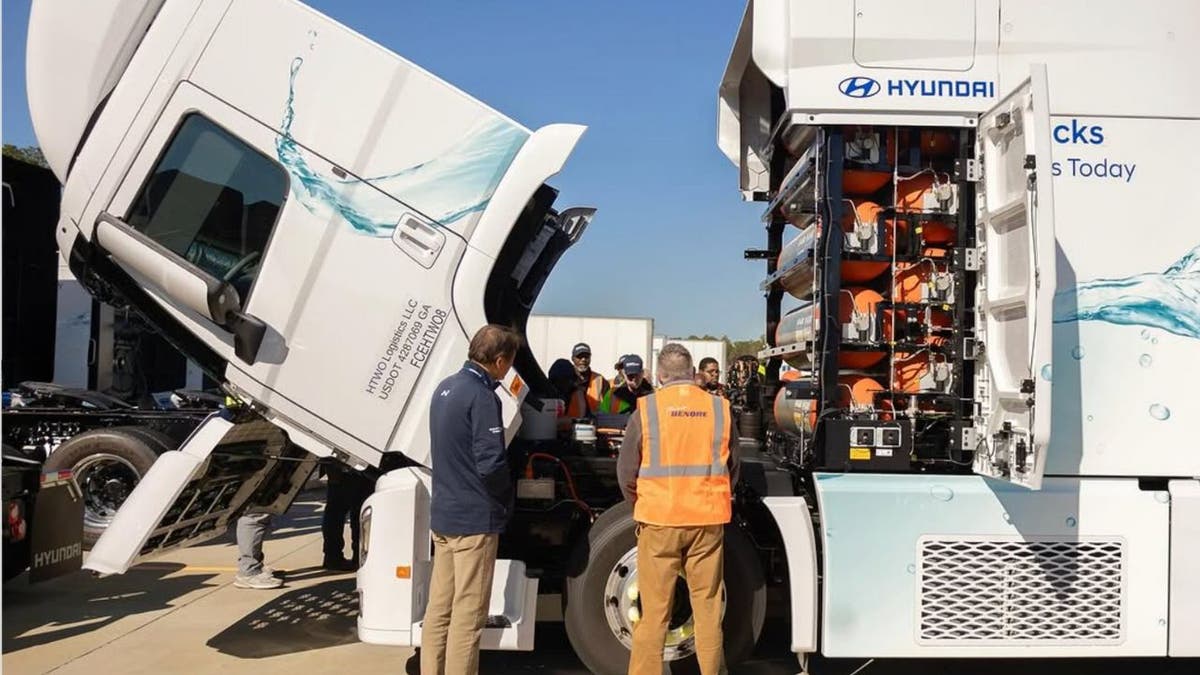Hydrogen fuel cell trucks hit the roads in Georgia

Imagine a future with a zipper along the highways without leaving a pollution trail behind the trucks. Georgia, Benore Logistic Systems Inc. Thanks to this, this will come true. This movement exhibits Benore’s sustainability commitment and at the same time positions the company as a pioneer in the adoption of green technologies for freight transportation.
Hyundai XCient Hydrogen Trucks (Benore Logistics Systems) (Kurt “Cyberguy” Knutsson)
A brave step towards sustainability
Benore Logistics Systems’ Journey to Hydrogen -Working Logistics began in 2022, when he launched the first four fuel cell trucks, with a small but important step. Based on this success, the company expanded its fleet with these 14 trucks. They operate on special routes in Savannah and serve Hyundai Motor Group Metaplant America, a facility for completely clean logistics operations. These trucks offer a significant leap forward in sustainable transportation, offering an impressive completely electric range.
In Benore, Vice President of Revenue Strategy and Operation Development in Benore, Emphasizing the importance of this initiative: “This hydrogen fuel cell trucks is an important step for Benore and our ability to offer innovative, innovative, sustainable logistics solutions.”
It is clear that Benore is serious in terms of creating a positive impact on the environment.
Discovering hydrogen -working vehicles for the future of transportation
Strategic partnerships that increase innovation
The deployment of these trucks is part of a wider cooperation between Hyundai and Glovis America, Benore, Hyundai Motor Group and Htwo Logistics. Hyundai produces trucks, controls HTWO distribution, and Benore manages daily logistics to provide uninterrupted operations for the Glovis home contract. This partnership shows how stable it is to provide innovative, sustainable solutions to Benore’s timely and only in line with its sequence operations.

Hyundai XCient Hydrogen Trucks (Benore Logistics Systems) (Kurt “Cyberguy” Knutsson)
Hydrogen -working recovery truck broke a world record and only spit water
Infrastructure supporting hydrogen logistics
To support this attempt, Hydrofleet has invested $ 33 million in a hydrogen production and fuel supply center near Savannah’s busy container port. This facility will initially refuel up to 14 trucks per day and scale up to 50 trucks per day in the future. Such infrastructure investments are very important for expanding the hydrogen -run load solutions in the region.
Industrial Trends and Challenges
Benore’s adoption of hydrogen -operating trucks is aligned with a growing industry trend and joins other major players, such as Werner and DHL supply chain to adopt this clean technology. Despite the setbacks faced by competitors such as Hyundai, Hyzon and Nikola, North America’s leading hydrogen fuel cell trucks appeared as a supplier. Increased interest in hydrogen technology is due to the potential to reduce emissions, and each class can eliminate more than 400 metric CO2 in 8 trucks per year.
However, the hydrogen fuel cell is not without obstacles to passage to trucks. Due to its high initial costs, expensive fuel cell technology and special hydrogen storage systems, it creates an important barrier, especially for smaller companies. The slow development of hydrogen fuel infrastructure continues to be a critical difficulty by preventing it from being widely adopted. In addition, the existing hydrogen production landscape dominated by methane -based processes remains below the desired environmental benefits.
In order to verify December estimates, to evaluate performance in various conditions and to address maintenance problems that affect the fuel station working time, the technological treatment of continuous tests continues. Reaching the cost parity with diesel fuel is very important for mass adoption, which makes estimates to reach $ 4-5 per kilogram to compete with diesel per gallon for $ 3-4 per gallon.
In spite of these obstacles, the potential of decreased emissions continues to interest and invest in hydrogen fuel cell technology for the truck industry. While companies such as Benore are leading, the sector closely follows how those who adopt these early adopts have passed through difficulties and how they open the path of a cleaner future in heavy service transportation.
Subscribe to Kurt’s Youtube channel for fast video tips on how to work all your technology devices

Hyundai XCient Hydrogen Truck (Benore Logistics Systems) (Kurt “Cyberguy” Knutsson)
Hydrogen -powered vehicles: addressing questions and difficulties
Hydrogen -powered vehicles fired the interest in the potential of revolution in transportation. However, its adoption reveals critical questions about cost, environmental impact, security and infrastructure. Below is a summary of basic information and difficulties based on expert analysis.
Cost and feasibility
- High production costs: Hydrogen is currently compared with diesel at $ 7.62, the Gallon equivalent costs about $ 16,51 and important energy for production (8.410 kWh).
- Energy efficiency concerns: Scholarship of hydrogen production to reduce costs continues to be a great difficulty.
Environmental impact
- Green and gray hydrogen: Green hydrogen (produced by renewable energy) provides close to zero emissions, while most hydrogen is derived from fossil fuels (gray or blue hydrogen) that emit CO2 during production.
- Water Vapor Emissions: Although water vapor is a by -product, localized heating effects are minimized compared to CO2.
Security issues
- Empty Risks: Modern hydrogen storage tanks are designed to withstand excessive effects, but public opinion concerns about security due to historical events such as Hindenburg disaster continue.
- Emergency Protocols: Innovations in tank resistance and emergency intervention systems are very important for public confidence.
Performance in excessive conditions
- Hydrogen vehicles perform well at various temperatures, but in cold climates, freezing water vapor emissions are faced with difficulties. Integrated heating systems can reduce these problems.
Infrastructure and logistics
- Distribution Difficulties: Hydrogen requires special storage and fuel supply infrastructure. Transforming existing gas stations can reduce costs, but its widespread adoption requires significant investment.
- Remote soothing solutions: Portable hydrogen generators are developed to address fuel supply in isolated areas.
Comparison with Electric Vehicles (Houses)
- Hydrogen vehicles offer faster fuel supply times and lighter energy storage space than homes. However, hydrogen production is more energy -intensive, house batteries are faced with sustainability concerns due to rare soil mining and recycling problems.
Wider obstacles
- Economic and political obstacles, including lobby by the high infrastructure costs and traditional energy sectors, continue to be important obstacles in mass adoption.
Next steps for research
Locking areas for future discoveries are as follows:
- Life Cycle Emission Analysis to Define Sustainable Production Methods
- Innovations in Safety Protocols for Hydrogen Storage
- Expanding of hydrogen fuel supply infrastructure
- Production production to make hydrogen cost competitive with fossil fuels and homes
Hydrogen -powered vehicles are a promising step for sustainable transportation. However, its achievements depend on economic, environmental and logistics difficulties through innovation and cooperation.
Great equipment gives unmanned shipping on the wheel
Kurt’s basic inferences
The expansion of Benore logistics systems to the hydrogen truck is more than just one business movement; A statement about the future of logistics. By adopting the latest technology and sustainable practices, Benore is an example for others in the sector. As Kunz says appropriately, these initiatives lead to cleaner transportation solutions that benefit both the planet and future generations. As a center for innovation, Savannah points to a promising section in the green logistics evolution. It will be interesting to see where this will take us.
Are the potential benefits of hydrogen fuel cell trucks such as zero emissions and faster fuel supply, or do they condemn to remain as a niche technology? Type us by writing to us Cyberguy.com/Contact.
For more information for my technology tips and security warnings, Cyberguy.com/newsletter.
Ask Kurt a question or let us know which stories you want to include.
Follow Kurt on social channels:
Answers to the most desired cyberguy questions:
New from Kurt:
Copyright 2025 Cyberguy.com. All rights reserved.




